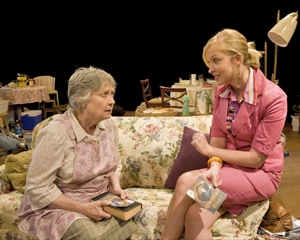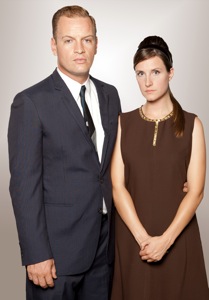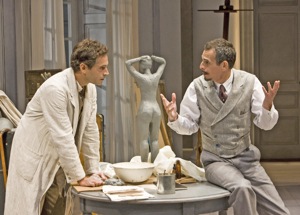Theater
Of warfare, religious and psychological
Published Thursday, 15-Oct-2009 in issue 1138
‘The Savannah Disputation’
Theological discussions about nitpicky little points of biblical translation are best left to theologians and academics, but playwright Evan Smith puts them in the mouths of two elderly sisters, a pretty young fundamentalist and a tired priest in The Savannah Disputation.
The Old Globe Theatre presents Evan Smith’s theological comedy (if that’s quite the term) through Sunday, Nov. 1 at the Copley Auditorium of the San Diego Museum of Art. Kim Rubinstein directs.
Mary (Nancy Robinette) and her elder sister Margaret (Mikel Sarah Lambert) share a cluttered house in Savannah. They are Catholics (with saint statues and a huge Bible in view) and comfortable in their faith, imperfectly understood though it may be.
Fundamentalist Melissa (Kimberly Parker Green), whose own indoctrination has included assertions that Catholics are going to hell and yoga is “satanic,” provides the conflict when she appears at the door with the opening gambit, “Are you saved?”
Mary, sharp of mind and tongue, does not suffer fools gladly, and her impatience makes her quick to use the label. She orders Melissa off the property with the promise to call the police the next time she appears.
But (you saw this coming, right?) Margaret, rounder of person and personality, and more tolerant of ideas not her own, lets Melissa in the back door and even takes a pamphlet.
The infuriated Mary, intent on “crushing” the young fanatic (what a Christian endeavor), sets up a second meeting which will include unsuspecting local parish priest Father Murphy (James Sutorius), who arrives expecting nothing more than his usual Thursday dinner with the sisters.
Smith has a talent for creating watchable characters, but may well alienate some audience members with the sitcom-like treatment of them and of the topic. Questions such as which “rock” Jesus built his church on (the answer to which depends on whether he said anything at all about it, and if so, which translation got it right) are more likely to put listeners to sleep than to engage them. We had more interesting discussions in the college dorm, where the question was whether there is a God, and whether it matters.
These are stock characters all, though Smith makes them fun to watch, especially with this fine cast. Robinette’s combative Mary, operating with verbal guns blazing, makes us feel sorry for Lambert’s conciliatory Margaret, bewildered by her sister’s mean streak, at least until Mary finally lets her guard down enough to show us the hurt beneath the anger. Margaret (“the nice one”) just wants her question answered: Is Melissa right?
Sutorius’ Father Murphy is a quiet drunk with the intellectual heft for the fight but not the heart to destroy poor Melissa. He seems unaware that Mary has had a thing for him for years.
Green’s Melissa (she of the “Mission: Impossible” cell phone ringtone) has all the maddening pre-programmed answers except the one that matters most to her: where will she find a husband?
Smith has a way with entertaining dialogue, and there are many laughs in this script. What it lacks is originality and depth. Adams’ point seems to be that no one has all the answers, but this hardly seems to need restatement.
The Savannah Disputation plays through Sunday, Nov. 1, at the Old Globe Arena Stage at the San Diego Museum of Art. Shows Sunday,Tuesday and Wednesday at 7 p.m.; Thursday through Saturday at 8 p.m.; matinee Saturday at 2 p.m. For tickets, call 619-23-GLOBE or visit www.TheOldGlobe.org.
‘Who’s Afraid of Virginia Woolf?’
George and Martha are back with their harrowing brand of verbal humiliation and psychological warfare and that silly little song about Virginia Woolf.
Edward Albee’s Who’s Afraid of Virginia Woolf? plays through Saturday, Oct. 24, at Compass Theatre, directed by Shana Wride.
In a small New England town, history professor George (Dale Morris) and his wife Martha (Glynn Bedington) return home after a faculty party given by Martha’s father, the university president.
It’s 2 a.m., and George is settling happily into a drink when Martha announces she’s invited new biology prof Nick (Tyler Herdklotz) and his mousy wife Honey (Kelly Iverson) over for a nightcap. Little do they know what’s in store.
George and Martha have a toxic marriage characterized by Martha’s disdain for George’s lack of ambition and George’s hatred for the humiliation she regularly heaps on him. But they are bound for life in a sick relationship that unnerves us but works, in some strange way, for them.
Over the course of a liquored-up evening, psyches will be laid bare, painful secrets revealed and mocked, even a longstanding unspoken fantasy between George and Martha will be exposed.
It’s a disturbing but exhilarating evening of theater when it’s done right, and Compass does it justice, starting with Adam Lindsay’s terrific set design and period props.
Bedington’s Martha is a bit of a snarling tiger, ready to leap on anything weaker than she – and that includes everyone in this room. But for all the viciousness and anger, her vulnerabilities are palpable. She desperately wants something she knows she’ll never have, and we can feel it.
Morris’ George has managed to survive Martha somehow, but it seems he’s shrunk a little in stature with every furious outburst. But watch out – this seeming puppy dog still has teeth that can rip psychological flesh.
Herdklotz does a splendid job with Nick, playing him a bit stronger than is usually the case. He has to walk a tightrope, trying to maintain his dignity while not insulting the president’s daughter.
Iverson is excellent in the badly underwritten part of Honey. She is the innocent and diffident little wifey, seriously outclassed in this pool of sharks.
Bravo, Compass, for doing justice to this American classic.
Who’s Afraid of Virginia Woolf? plays through Saturday, Oct. 24, at Compass Theatre. Shows Thursday through Saturday at 7:30 p.m.; Sunday at 2 p.m. For tickets, call 619-688-9210 or visit www.CompassTheatre.com.
‘Creditors’
Creditors is a perverse little three-person piece about toxic love relationships, the urge to destroy and the need to possess. It was written in 1888, the same year as his much more famous Miss Julie; in fact, they were originally presented on a double bill.
Doug Wright, whose brilliant script catapulted his I Am My Own Wife from a workshop production at La Jolla Playhouse to two Tonys and a Pulitzer Prize, returns to direct his adaptation of the Strindberg one-act, which plays through Sunday, Oct. 25, at the Sheila and Hughes Potiker Theatre.
Adolf (Omar Metwally), a painter and sensitive soul, had hoped for a marriage of soulmates with Tekla (Kathryn Meisle), and is disappointed that she does not find him sufficient, but evidences a puzzling need to socialize outside the marriage. She is, in fact, downright flirtatious.
Gustav (T. Ryder Smith) is the brains of the trio; the sort who likes to analyze and dissect. In his scene with Adolf, Gustav uses his superior intellect not only to undermine Adolf’s already shaky confidence in Tekla’s fidelity, but also to convince his easy target that he is a prime candidate for epilepsy.
And what of Tekla? She is an attractive and sociable woman who could be read as just a girl who wants to have fun, or as the vampire Gustav suggests she is. In either case, she seems undeterred by the effect her actions have on others.
The play is set in one black-and-white room of a spa, with enormous glassed doors behind which distracting light can be seen, presumably sunlight bouncing off a pool.
Wright’s adaptation updates the language and keeps Gustav’s identity out of the program in the attempt to create some mystery. It’s only partially successful; the natural tendency to wonder why this man is getting so personal with a perfect stranger creates another unnecessary distraction.
Still, Wright’s top-notch cast makes the most of this static play. Smith’s suave coolness keeps Metwally’s Adolf on the edge of breakdown; Meisle may be an early feminist in her failure to understand what these men are complaining about.
Strindberg wasn’t a good fit for late 19th-century Sweden. He was a misogynist (three failed marriages probably didn’t help); wrote plays deemed so radical that he had to publish them elsewhere; was tried for (and acquitted of) blasphemy; dabbled in alchemy (he thought he could make gold) and the occult; suffered paranoia and near madness, and died alone.
But he is considered Sweden’s greatest writer and his lasting global influence on poetry and theater is undeniable.
Creditors is a short play; still, today’s audiences are likely to see it as talky. But it’s interesting as psychological warfare (albeit it one-sided), and a perfect complement for Who’s Afraid of Virginia Woolf.
Creditors plays through Sunday, Oct. 25, at La Jolla Playhouse’s Potiker Theatre. Shows Tuesay and Wednesday at 7:30 p.m.; Thursday through Saturday at 8 p.m.; Sunday at 7 p.m.; matinees Saturday and Sunday at 2 p.m. For tickets, call 858 550-1010 or visit www.lajollaplayhouse.org.
|
|
Copyright © 2003-2025 Uptown Publications




